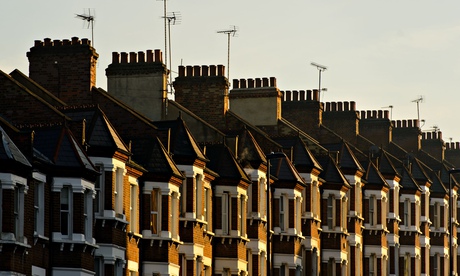UK house price inflation to outstrip pay rises 'for years to come'
07-12-2014
OBR says only 'historically unprecedented' housebuilding activity can prevent loan-to-income ratios rising year after year
Angela Monaghan and Miranda van Noorden
The Guardian,

The OBR said many more houses will need to be built to keep prices in line with incomes. Photograph: Dominic Lipinski/PA
Soaring house prices are likely to outstrip pay rises for at least the next five years ad possibly for decades to come, the government's official forecaster has warned.
The Office for Budget Responsibility said households will have to pay an increasing proportion of their income on mortgage bills to meet higher property values and only a "historically unprecedented" boom in housebuilding would prevent loan-to-income ratios rising year after year.
The OBR, which developed a new method of predicting future price movements by bringing together a range of property value measures, said:"The model implies that house prices will consistently rise faster than income, barring a strong and historically unprecedented response from housing supply, leading to a steady rise in household debt relative to income."
The OBR said it wanted to give the government and the Bank of England a clear picture of the path house prices will take over the coming years, though it admitted much of its analysis was subject to judgments by researchers.
Many academics and City analysts have predicted property price rises above annual earnings increases following a dramatic rise in the population and only moderate increases in the supply of homes. The OBR said publishing detailed diagnostic tests of historical data would allow policymakers to understand how changes in interest rates and other factors will influence prices over time.
In a separate paper on Thursday, the OBR said a growing population based on more immigration was needed to tackle Britain's ageing population, which would put a greater strain on the public purse than previously feared.The OBR said the latest population projections suggested government spending would have to rise by about £80bn in today's money – or almost 5% of GDP – between 2017-18 and 2063-64 to cope with an older population.
Giving its annual verdict on the sustainabllity of the public finances over the next 50 years, the independent body said the worsening financial burden could mean further tax rises or spending cuts were needed after the chancellor's current round is completed.
The cost of healthcare, pension payouts and long-term care would all increase as the proportion of the population aged 65 and over rises to 27% by 2064 from 17% this year, the OBR said.
Robert Chote, OBR chairman, said: "Compared to last year, the latest population projections suggest there will be fewer people of working age, more people in their 80s and 90s, and roughly the same number of children. So the ratio of workers to non-workers is lower, which increases fiscal pressures.
"As a result, some additional fiscal tightening is likely to be needed after the current crisis-related consolidation has been implemented."
In comments that are likely to be picked up by anti-immigration campaigners, Chote said more immigration than is currently forecast would improve the outlook for the public finances over the next half a century.
"This is because inward migrants are more likely to be of working age than the rest of the population. So we avoid the cost of educating them and some will leave before we have to finance them in old age. But the impact may be less beneficial over a longer time horizon as more inward migrants retire," he said.
Overall, Chote said the long-term outlook for the public finances was "slightly less unsustainable" than at the time of its last report a year ago because the government has since extended public spending cuts for an extra year to 2018-19, and will link the state pension age to rising life expectancy. That means that by 2064, people are likely to have to work until 70 before being eligible for a state pension, saving the government about £14bn a year at today's prices.
George Osborne, said: "[The] report from the OBR provides further evidence that the government's long-term economic plan is working and the country's hard work is paying off. It shows that as a result of the decisions we have taken over the past year, in the next 50 years, debt as a share of our national income will be two thirds of GDP lower than it would have been."
Meanwhile, in a blow to Alex Salmond's campaign for Scottish independence, the OBR sharply lowered its forecasts for North Sea oil and gas revenues.
It expects a total of about £40bn or 0.06% of GDP will be raised in North Sea revenues between 2020 and 2041, down by a quarter compared with its expectations last year as production falls.
Scotland's yes camp is more optimistic on the outlook for oil production. A spokesman for the Scottish energy minister, Fergus Ewing, said: "North Sea oil is a bonus, not the basis, of an independent Scotland's economy, and is a fantastic asset which will be around for many decades to come. But in an independent Scotland that oil wealth will be properly invested, not squandered, as it has been by successive Westminster governments.
"The OBR's forecasts rest on estimates of future production which are well below those used by the industry, by leading experts and by the UK government."

